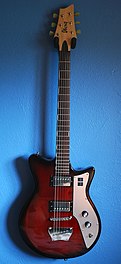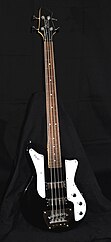Ibanez Jet King
| Ibanez Jet King | |
|---|---|
| Manufacturer | Ibanez |
| Construction | |
| Body type | Solid |
| Neck joint | Bolt-on |
| Woods | |
| Body | Basswood(JTK1) Mahogany(JTK2,3,4) |
| Neck | Maple |
| Hardware | |
| Bridge | Tune-o-matic |
| Colors available | |
| Varies with Model | |
The Ibanez Jet King is the term for a family of electric guitars sold by Ibanez. The family includes:
- Jet King 1 (JTK1) — resembles EJ-2 by FujiGen[1] and Teisco MJ-2.[2]
- Jet King 2 (JTK2) — resembles Ibanez Rhythm Maker by Guyatone in 1960s.[3][4][5]
- Jet King 3 (JTK3)
- Jet King 4 (JTK4)
Jet King 1
According to the Harmony Central press release the original JTK1 had the following pickups: Neck Pickup: Powersound PSND1 Humbucker, Bridge Pickup: Powersound PSND2 Humbucker. Some owners of the JTK1 have however reported finding Ibanez Super 58 pickups... although whether these were later production models and shortly before the phasing towards JTK2 is unestablished. It had a different body compared to later versions, with a smaller upper horn and the tuners were 3-a-side. It was available in Butterscotch Transparent, Ivory, Metallic Light Blue, and Black Red Sunburst.
Jet King 2
The Jet King 2 (Also, Jet King II, Jetking II, JTK2) was essentially an upgrade of the original. The machine heads now were on one side, and the body was changed to its current shape.
The first and discontinued edition of the Jet King II is probably the most collectible of all the range.[citation needed] The body is finished in brown sunburst with tortoise pickguard and has two Ibanez Super 58 pickups for neck and bridge. The Jet King II models made from 2003/11 to 2004/10 features a 1-piece maple bolt-on neck with rosewood fingerboard and the body is mahogany. The second and most popular edition of the JTK 2 (black and white and red and white) has only one Super 58 pickup for the neck, one Axis pickup for the bridge and a 3-piece neck like most Ibanez guitars. Standard colors for the Jet King II second edition were black or red with white pickguards, though examples of a white body and black pickguards have been seen.[citation needed] The Ibanez Super 58 pickup has a warm vintage sound while the Axis has a brighter and more aggressive sound. It has one volume knob, one tone knob, "rocker switches" used for coil splitting (for even more versatility), a fixed Full Tune III bridge and a string-thru body construction, providing fair sustain. The "rocker switches" allow this guitar to be very versatile.[citation needed] Some players[who?] claim it can imitate a Fender Jazzmaster or a Gibson Les Paul.
Jet King 3 and 4
At the 2007 NAMM Show, two new Jet Kings were revealed. The "retro-style" mahogany body remained the same; however, unlike its predecessors, no rocker coil splits were included on the new models.
The Jet King 3 features two P-90 style soapbar pickups, the IBZ HFS1, and IBZ HFS2. Standard colors are "Roadster Orange Metallic" and "Bluestone." "Turquoise", and "Red Bean" colors are available in limited markets.
The Jet King 4 featured a Bigsby-style tremolo and two humbuckers, the ACH3 neck pickup and ACH4 bridge pickup.
Related
Other related Ibanez guitars are:
- The Jet King Bass (JTKB200BS)
- The Rhythm Maker (model 1830~1880 in 1960s)[5][4]
- The ORM1 (Omar Rodríguez-López signature model)
Notable Jet King players
- Jimi Hendrix[6]
- Matt Hollywood, The Brian Jonestown Massacre
- Andy Jackson, Hot Rod Circuit
- Brittany Howard, Alabama Shakes
- David Lowery, Camper Van Beethoven, Cracker
- Omar Rodriguez-Lopez, The Mars Volta
- Tara Hoffman, Kitten Disaster, DUIdols
- Tinderwet
- Jason Weiche, "Stolas", "The Akashic Record"
- Tyler Matrix, The Kartel Matrix
- Derek Heath, The Regal Peaches
- Niall Kennedy, And So I Watch You From Afar
- David Tapley, Tandem Felix
- Robbie Fox, Pup Punk
- Adam Hopper, Blanketman
- James Barnard, Sludgefeast[7]
- MDN Múnich 72 (https://www.facebook.com/munichsetentaydos/)
See also
- FujiGen — JTK1 is originated in EJ-2-T by FujiGen in 1960s.
- Guyatone — JTK2 is originated in Ibanez Rhythm Maker supplied by Gutatone in 1960s.
- $100 Guitar Project
Notes
- ^ EJ-2-T was manufactured by FujiGen during c.1962–c.1965, and exported under several brands including: St George, Zim-Gar, etc..
- G L Wilson (24 January 2010). "St George-branded vintage Japanese guitar - pristine condition". Guitarz.
The St George brand was created for the St George music stores which had branches in Hollywood and New York in the 1960s...
- ZimGar guitar played by Jon Spencer, seen on:
Tessa Jeffers. "Interview: Jon Spencer Blues Explosion". Premier Guitar (October 2012). Archived from the original on 2013-03-04. Retrieved 2013-04-02.Jon Spencer plays his legendary Zimgar guitar (bought from a pawnshop by his wife) in dropped-D tuning.
- "1965 Palmer/Tempo (Matsumoku) Japanese Guitar". Drowning in Guitars!. May 27, 2012.
- G L Wilson (24 January 2010). "St George-branded vintage Japanese guitar - pristine condition". Guitarz.
- ^
Mark Cole (2006-12-12). "MJ-2L (1965), WG-2L (1963) - My Teiscos". Teisco Twanger's Paradise.
Note1: the design origin (including side-block fret marker on JTK1) might can be dated back to 1959 Marco Polo "TL-59", produced by Guyatone, built by Kiso Suzuki Violin:- "1959 Guyatone Marco Polo "TL-59"". PulseBeatGuitars.com.
The story of this rare Marco Polo guitar started as a production design under the direction of Guyatone House-Brands in 1958. It was built at the Suzuki [i.e. Kiso Suzuki Violin] ... The Marco Polo was styled, more-or-less, after the Fender Jazzmaster-shape with its offset guitars waist. ... extended upper horn and backward sloped lower cut-way. ... Guyatone was also particularly known for their "Gold Screen" pickups. Featuring a Rosewood Fingerboard with Side-Block Fret Markers ...
- Meyers, Frank (January 12, 2014). "Tokyo Flood-1964 Guyatone LG-55W Guitar [Kent Las Vegas]". DrowningInGuitars.com.
- "1959 Guyatone Marco Polo "TL-59"". PulseBeatGuitars.com.
- ^
"Guyatone Gallery". GuyatoneGuitars.com. DeMont Guitars.
Bill Menting (oncevlectrum-undervlectrum.com) Left to right, EG-90, Model 1840 large body, extra volume and tone, set neck model 1202 bass, 1830 small body, 1830 large body/headstock, set neck model 1860.
{{cite web}}: External link in|quote= - ^ a b c d "Hoshino Gakki Ten: IBANEZ and related brands..." OnceVlectrum-UnderVlectrum.com. Archived from the original on 2022-01-09.
{top} Here we have a '57-'59 Guyatone made model EG-90, sold to Hoshino, and exported to Canada under the Regent name. ... No picture exists in any Hoshino literature or website. ...", "{Middle} A rare one here, an Ibanez model 1860 large body set neck, circa 1960. This old girls claim to fame is that one of these models was owned by the late Jimi Hendrix. ... It is also Guyatone made.", "{Bottom} Here we have a much later Ibanez, made after the closing of the Tama plant in 1967. Most likely Teisco made, ... A rare bird under the Ibanez brand name.", "Model 1830 bolt on neck
{{cite web}}: External link in|quote=
All models introduced on this page are:- [Top] model EG-90 under Regent brand (1957-59), model 1860 large body setneck (c.1960), [Kawai S-80 type] later model (after 1967)
- [Left] Burns influenced model 1802 (early 1960s), model 883 (1962) and model 882 (1963), model 1943 very rare set neck (late 1950s), earlier version of model 994 (1963), and model 1830 bolt on neck (relative of model 1860 in early 1960s)
- [Right] model 901 under Goldentone label and 902 under Continental label (1962-63), model 1201 under Hy-Lo label (1962) and model 1502 (1962-63), Burns Bison Copy Era first model 995 under Maxitone (1963) and last [Tama] manufactured model 3902x (1966), Jaguar styling model 882 (1963-64) and another Burns Bison influenced model 3903 under Goldentone label.
- ^ a b Ibanez Electric Guitars, Hoshino Gakki Ten, Ltd., 1961, p. 1, 2, archived from the original (catalog) on 2011-08-20, retrieved 2015-05-22
"No.1830 [2pu] ... / No.1850 [3pu] ... / No.1860 [2pu with tremolo] ... / No.1880 [3pu with tremolo] ... / No.1950 [bass] ..." - ^ https://www.groundguitar.com/jimi-hendrix-gear/jimi-hendrixs-ibanez-jet-king/
- ^ "Sludgefeast on Facebook". Facebook. Archived from the original on 2022-04-27.[user-generated source]
References
- "Ibanez Parts Catalog - Jet King". Ibanez. — including the images of JTK1BRS, JTK1BT, JTK2BS, and JTK2CP
- OUTPUT. Y.M.M. Player Magazine mook (in Japanese). Tokyo: Player Corporation. 1982-01-20. ID:09818-1-20.
- 60's Bizarre Guitars. Guitar Magazine mooks / Rittor Music mook (in Japanese). Tokyo: Rittor Music, Inc. 1993-03-01. ASIN B0064YESZO. OCLC 269873814. ID:4-69771-02.
- Fjestad, Zachary R. (2014). "GUYATONE". Blue Book of Electric Guitars (15th ed.). Blue Book Publications, Inc. ISBN 978-1-936120-56-7.
- Meyers, Frank (2015). History of Japanese Electric Guitars. Centerstream Publications. ISBN 978-1-57424-315-4.
External links
- "Ibanez JTK series". Ibanez Guitars. Archived from the original on 2011-01-09.
- "Ibanez JTKB series". Ibanez Guitars. Archived from the original on 2010-01-08.
- "Ibanez ORM1 - Omar Rodriguez-Lopez signature model". Ibanez Guitars.
- "Signature & notable artists". Ibanez Guitars. Archived from the original on 2008-04-17.
- JTK series used by Andy Jackson (Terrible Things), Nitzan Hoffmann (Drive Like Maria), etc..
- JTKB series used by Henna (Stalingrad Cowgirls), Skinny Disco (Deathstars), etc..
- "JTK2 Jet King Review". ultimageGuitar.com. 2008-08-13.







